|
|
|
Sort Order |
|
|
|
Items / Page
|
|
|
|
|
|
|
| Srl | Item |
| 1 |
ID:
042665
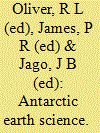

|
|
|
|
|
| Publication |
Cambridge, Cambridge University Press, 1983.
|
| Description |
xxii, 697p.Hardbound
|
| Standard Number |
0521258367
|
|
|
|
|
|
|
|
|
|
|
|
Copies: C:1/I:0,R:0,Q:0
Circulation
| Accession# | Call# | Current Location | Status | Policy | Location |
| 028960 | 551.0989/OLI 028960 | Main | On Shelf | General | |
|
|
|
|
| 2 |
ID:
148485
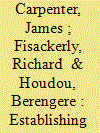

|
|
|
|
|
| Summary/Abstract |
Recent research has highlighted the potential of lunar resources as an important element of space exploration but their viability has not been demonstrated. Establishing whether or not they can be considered in future plans is a multidisciplinary effort, requiring scientific expertise and delivering scientific results.
To this end various space agencies and private entities are looking to lunar resources, extracted and processed in situ, as a potentially game changing element in future space architectures, with the potential to increase scale and reduce cost. However, before any decisions can be made on the inclusion of resources in exploration roadmaps or future scenarios some big questions need to be answered about the viability of different resource deposits and the processes for extraction and utilisation. The missions and measurements that will be required to answer these questions, and which are being prepared by agencies and others, can only be performed through the engagement and support of the science community.
In answering questions about resources, data and knowledge will be generated that is of fundamental scientific importance. In supporting resource prospecting missions the science community will de facto generate new scientific knowledge. Science enables exploration and exploration enables science.
|
|
|
|
|
|
|
|
|
|
|
|
|
|
|
|
| 3 |
ID:
085325
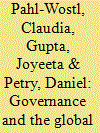

|
|
|
|
|
| Publication |
2008.
|
| Summary/Abstract |
Public policy on water has long been approached in the context of a locality, a country, or a river basin. However, scientific evidence now provides compelling arguments for adopting a global perspective on water management. This article argues that water governance today needs a multilevel design, including a significant global dimension. The discussion defines global water governance, highlights the implications for multilevel governance, and examines global water governance through the lens of governance typologies. The analysis along the categories of globalization/regionalization, centralization/decentralization, formality/informality, and state/nonstate actors and processes reveals that current global water governance is a fragmented, mobius-web arrangement. The article concludes by considering possible future trajectories of global water governance.
|
|
|
|
|
|
|
|
|
|
|
|
|
|
|
|
| 4 |
ID:
131408
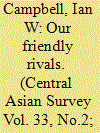

|
|
|
|
|
| Publication |
2014.
|
| Summary/Abstract |
The short-lived Emirate of Kashgaria was of strategic and commercial interest to both the Russian and British Empires. However, a close examination of the publications produced by the Russian and British missions to its ruler, Ya'qub Beg, militates against interpreting these missions as merely another episode of the Great Game, the century-long struggle for influence in Central and High Asia. Rather, Russian and British diplomats and travellers participated in a common culture of exploration, sharing a purpose and a European identity. This self-identification, in turn, was closely connected with the practice of exploration: objective measurement and scientific inquiry were coded as activities differentiating Russian and British travellers from the objects of their study. Although the information so gathered had political and strategic utility, the international networks and common values involved in its production established a network of mutual interests, respect, and cooperation even during moments of heightened geopolitical tension.
|
|
|
|
|
|
|
|
|
|
|
|
|
|
|
|
| 5 |
ID:
152035
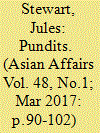

|
|
|
|
|
| Summary/Abstract |
This article provides an overview of the development of the exploration, mapping and surveying of the frontier territories of India in the 19th century and the context of the Great Game with Russia. It pays particular attention to the Pundits, the native surveyors trained by British officers who made long surveying journeys into the borderlands of the Himalayas and Tibet. It gives an account of the explorations of pundits including Nain Singh, Kishen Singh, Sarat Chandra Das, Kintup, and Ugyen Gatso.
|
|
|
|
|
|
|
|
|
|
|
|
|
|
|
|
| 6 |
ID:
166925
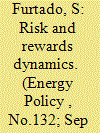

|
|
|
|
|
| Summary/Abstract |
The government needs to consider risk when designing a fiscal regime and oil companies need to assess prospect's risks when facing investment decisions. This paper analyzes how the fiscal regime dictates the risk-reward partition between companies and the government in a portfolio of prospects. The expected monetary value is provided as the decision criteria, and a decision model is presented where all the prospects are graphically represented. The fiscal regime's contract is generalized as a mathematical function and plotted together with the exploratory opportunities. This type of representation helps the policymakers to fine-tune petroleum contracts. It is also of great value to companies because it helps to understand the risks and rewards of a portfolio. We used the recent Brazilian fiscal regime change from a royalty and tax contract (R/T) to a partition share contract (PSC) to understand the impacts of the fiscal regime in the risk-reward balance of the prospects located at the recently discovered Pre-Salt geologic province offshore Brazil. We show how the policymakers can fine-tune the fiscal regime and how companies can better understand the contracts considering both the rewards and the risks involved.
|
|
|
|
|
|
|
|
|
|
|
|
|
|
|
|
| 7 |
ID:
150015
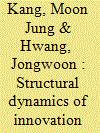

|
|
|
|
|
| Summary/Abstract |
Innovation in the renewable energy (RE) sector relies on the concept of systemic innovation, which requires interaction between two innovation aspects: technology exploration and market exploitation. The European Union (EU) has introduced political instruments for systemic RE innovation by integrating resources from different thematic and geographic areas. However, using these instruments to establish an ecosystem for systemic innovation remains unexplored. This study develops a framework for evaluating the systemic innovation performance of networks through a time-series analysis of network structural properties. Overall, EU-funded innovation networks have not evolved in a systemic direction. First, the network exhibits densely connected local clusters for technology exploration and market exploitation of RE innovation, which are disconnected from each other. Over time, the gap between the two phases has weakened with increasing connectivity, but the local clusters supporting either explorative or exploitative activities have diminished. The existing networking linkages among organizations are considered ineffective because their positions in the network tend to display a mismatch with their innovation patterns. This research presents policy suggestions for optimizing the exploration and exploitation activities in the EU's funding program and their complementarities to establish a systemic innovation environment in the RE sector.
|
|
|
|
|
|
|
|
|
|
|
|
|
|
|
|
| 8 |
ID:
158947
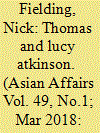

|
|
|
|
|
| Summary/Abstract |
Thomas and Lucy Atkinson were pioneering explorers of the Russian, Siberian and Central Asian Steppe in the 1850s. They both wrote books about their journeys which were feted in their own time, and in particular Lucy Atkinson was one of the first women to describe travels in this region in her 1863 work Recollections of Tartar Steppes and their Inhabitants. Thomas Atkinson was also an accomplished painter, and his sketches of the steppe were highly sought after in the period. However, these two trail-blazing explorers have been largely forgotten today. How do we explain this anomaly? Is there any reason we ought to know more about the Atkinsons? Why have they fallen from public view? Did they add to the knowledge of the physical world or to ethnography? This article will try to put their journeys and their achievements into some kind of context and, hopefully, make the case for a reassessment of their contribution to the history of exploration.
|
|
|
|
|
|
|
|
|
|
|
|
|
|
|
|
|
|
|
|
|